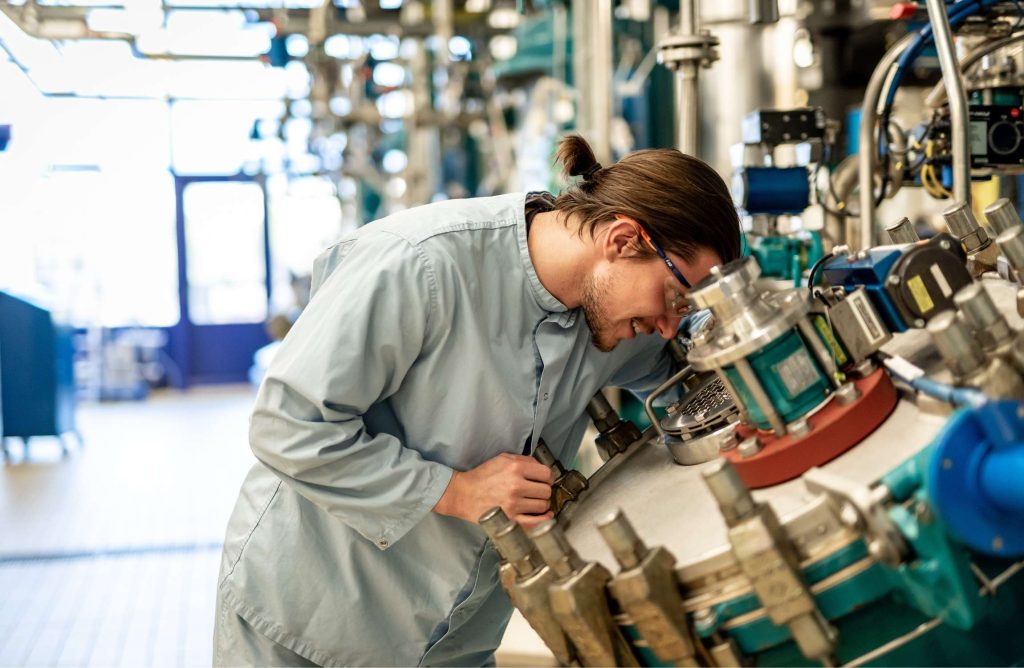
The Innovation and Chemical Industries
PEOPLE’S LIVES DEPEND ON CHEMISTRY
Possessing knowledge and understanding of chemical properties is essential for the basic functions of modern society. These properties also provide essential aspects of people’s everyday lives. Without chemicals it would not be possible, for example, to remove waterborne diseases from our drinking water or maintain high standards of hygiene in healthcare. Chemicals are
also used in the home in green and effective cleaning products, as well as in food preparation and to increase the shelf life of our food. We could draw up a long list of the roles that chemicals and their properties play in our everyday lives.
Chemistry is also crucial for Swedish industry. Almost all the goods we produce – a full 96 percent – are in some way dependent on chemistry. This includes the medicines that relieve pain and cure deadly diseases. Today, people in the EU are living almost 30 years longer than they did a century ago. The ability to use chemicals has improved people’s living conditions and enabled many to live longer, healthier and more productive lives. Chemicals have also enabled us to maintain a standard of living that our ancestors could only dream about. Chemistry is absolutely crucial in all other types of industrial production as well and therefore also essential for Sweden’s economic and social welfare.
People’s knowledge and curiosity about chemistry goes way back in history. Groundbreaking discoveries have laid the foundation for today’s modern chemical industries. But we still have a lot to learn about chemistry and what it can do. Research in the fields of chemistry, toxicology, materials science and environmental science is constantly advancing and challenging us to re-examine old truths and seek new solutions to both small and large societal problems.
The Roadmap of the chemical, plastic and pharmaceutical industries contains goals for reaching climate neutrality by 2045. These industries in Sweden have agreed on three common goals. Each individual industry – chemical, pharmaceutical and plastic – has also agreed on specific goals. For clarification, these goals are not for each individual actor but for the industry/sector collectively.
For each goal there is a description of what is expected of policymakers and of industries’ own commitments. The commitments and proposed actions are not listed in any particular order. All actors need to be proactive and turn their goals into concrete actions based on what they are able to influence and the opportunities that arise.
THE CHEMISTRY, PLASTIC AND PHARMACEUTICAL INDUSTRIES’ COMMON GOALS
2035: 40 percent of the raw material we use is recycled or bio-based
2045: 80 percent of the raw material we use is recycled or bio-based
This goal includes Scope 3.
After 2045 efforts to replace the remaining fossil raw material will continue depending on the new technologies and new materials resulting from innovation. The goal is for all carbon atoms to only be bound in materials until they can be circulated again and thus not cause any GHG emissions into the atmosphere. Transformer oil is an example of a chemical product where it is currently difficult to replace the fossil raw material.
- Aggregates industry
- Agricultural sector
- Automotive industry – heavy transport
- Automotive industry – passenger cars
- Aviation Industry
- Cement industry
- Concrete industry
- Construction and civil engineering sector
- Digitalisation consultancy industry
- Electricity sector
- Fast moving consumer goods industry
- Food retail sector
- Forest sector
- Gas sector
- Heating sector
- Heavy road haulage industry
- Maritime industry
- Mining and minerals industry
- Petroleum and biofuel industry
- Recycling sector
- Ski resort sector
- Steel industry
- The Innovation and Chemical Industries



